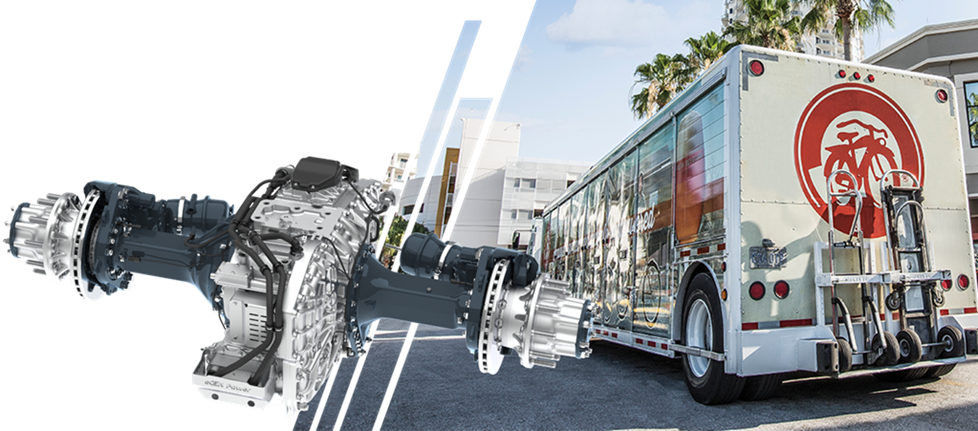
Now with two electrification engineering centers in the United States and a third in the United Kingdom, Allison Transmission is powering ahead in e-propulsion with market penetration initiatives on numerous fronts. Much of the activity is centered around its new eGen Power series of zero emission elctric axles for medium and heavy-duty commercial vehicles and for defense and homeland security vehicles. Several fuel cell integrations are among the projects.
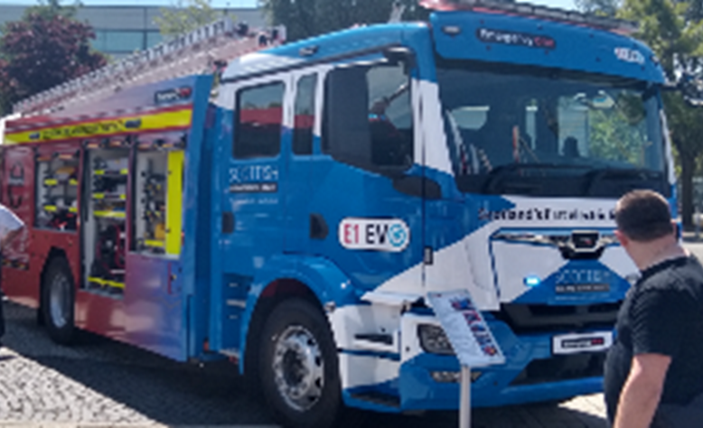
The company’s eGen Power 100D electric axle was recently integrated into a new line of fully electric fire and rescue vehicles, shown above, by Emergency One, the UK’s largest manufacturer of them. “The industry-leading technology provided by the Allison eGen Power 100D was critical in bringing our latest E1 EV0 electric vehicle to market,” said Michael Madsen, managing director of Emergency One. “As the world’s first all-electric pumping vehicle that is fully certified to the BS EN1846 standard, EV0 exceeds standard requirements for electric driving range and pumping performance at zero emissions. This fire engine is the first in the UK to feature an innovative all-electric rear drive axle installation.”
The eGen Power 100D is a drop-in solution designed for easy installation into the current vehicle frame. The e-Axle integrates two high-speed electric motors and a multi-speed transmission, eliminating the need for additional drive shafts and support structures. One of the most powerful electric axle systems on the market, the eGen Power has a continuous output power of 454 kW and a peak output power of 652 kW. It was designed to deliver optimum efficiency, fast acceleration, high speed and increased maneuverability, which are all critical for fire and rescue vocations where failure is not an option and every second counts.
“We’re proud to continue our longstanding partnership with Emergency One to provide our award-winning e-Axle for their next-generation platform of electric vehicles,” said Heidi Schutte, vice president of EMEA, APAC, and South America sales for Allison. “The vehicle was unveiled in June at a fire and rescue tradeshow in Hannover.
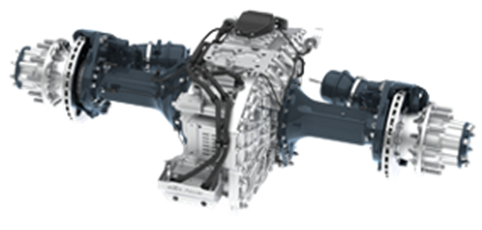
In addition to the two electric motors, the eGen Power series also incorporates a two-speed gearbox in the central housing, enabling the high torque required to get heavy loads moving, while also offering the benefit of superior efficiency at cruise speed. The 100D is capable of supporting up to a 10.4 ton gross axle weight rating and also includes differential lock functionality.
The eGen Power 100S is an extension of the eGen product line designed for medium and tandem-axle heavy-duty vehicles in North American markets, and the eGen Power 130D, a variant of the 100D, specifically designed for the European and Asia Pacific markets, where many commercial vehicles require a heavier 13-ton gross axle weight rating. The eGen Power 130D maintains the same core components, performance, and differentiated value as the eGen Power 100D, including the power ratings previously mentioned for the 100D, but with increased axle weight rating capability.
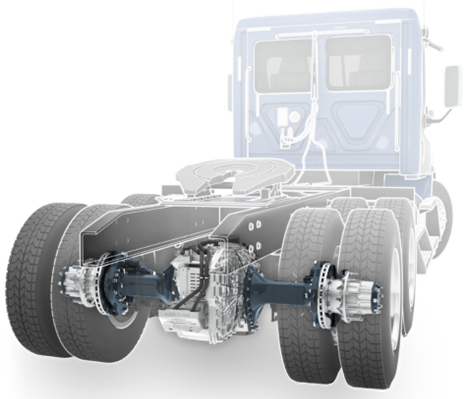
In the military arena, the two vehicle manufacturers selected to compete for the U.S. Army’s Mobile Protected Firepower (MPF) contract have selected Allison’s 3040 MX cross-drive transmission for their vehicles. NGET is the newest product in Allison’s extensive armored vehicle portfolio, meeting requirements across a wide spectrum of applications. Key design features include an electric hybrid architecture that will offer the warfighter the benefits of reduced detection by the enemy and increased soldier survivability, exportable power provisions for on- and off-board systems.
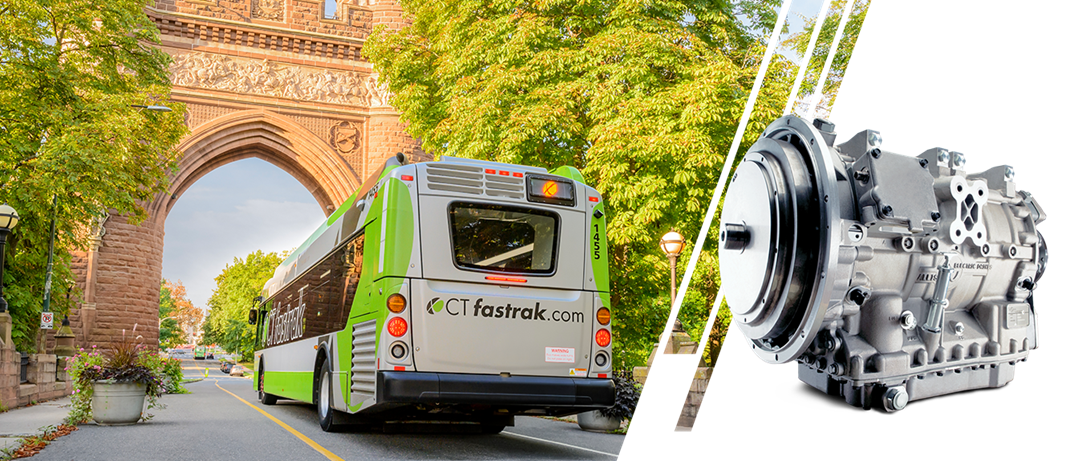
In partnership with GILLIG and Cummins, the first buses equipped with its Allison eGen Flex electric hybrid propulsion system arrived at the Indianapolis Public Transportation Corporation (IndyGo) recently. The eGen Flex is the next generation of Allison’s H 40 EP electric hybrid propulsion system, which has been operating in select IndyGo buses since 2004. In addition to the benefits provided by the H 40 EP, such as improving fuel consumption by up to 25% versus a conventional diesel bus, the eGen Flex provides evolutionary capabilities which include full electrification.
The eGen Flex, which is paired with the Cummins B6.7 engine in GILLIG buses, can travel in electric-only mode for up to 10 consecutive miles or 50 minutes before converting back to hybrid propulsion. The electric-only mode can be utilized multiple times per route and per day. The eGen Flex can operate up to 50% of the time in engine off mode while still powering auxiliary systems like air conditioning and heat at optimal efficiency. The system’s electric-only mode is activated through geofencing technology and eliminates engine emissions and noise while loading and unloading passengers.
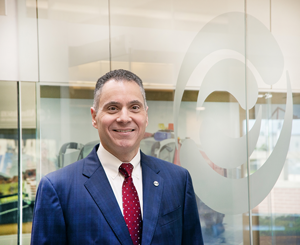
“Allison understands that while there is significant interest in electrification, many transit agencies face challenges in adopting fully electric solutions. The eGen Flex enables fleets to evaluate full electric capability while maintaining a diesel engine for added flexibility,” said David Graziosi, chairman and CEO of Allison. IndyGo will be the first transit system to operate GILLIG buses equipped with the Allison eGen Flex and Cummins B6.7 engine pairing.
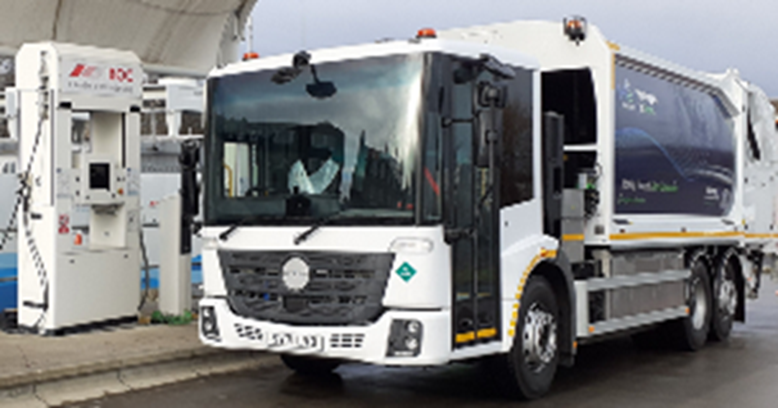
Fuel cell integrations are in play as well. In Scotland this spring, Allison was selected to provide the propulsion system for the UK’s first hydrogen fuel cell refuse collection vehicle (RCV). Aberdeen City Council chose to pair a 250 kW Hyzon electric motor with an Allison 3000 Series transmission in conjunction with a 45 kW fuel cell. Powered by Aberdeen’s existing hydrogen infrastructure, the RCV has a range of 155 miles, enabling it to travel greater distances than existing electric vehicles and to complete its route without returning to the depot to recharge. The innovative new hydrogen-powered refuse truck is based on the 4200 mm wheelbase HH-Mercedes-Benz Econic Hydrogen chassis and has a 15kg tank capacity at 350 bar and 140 kWh batteries at 700 volts. The vehicle is the latest step in the H2 Aberdeen initiative, which aims to bring about a hydrogen economy in the city’s region.
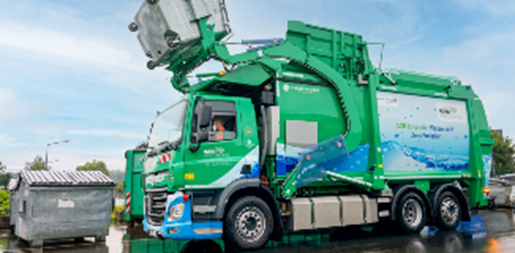
In the Ruhr area of northern Germany, Allison is providing the transmission for an innovative retrofit project to investigate how hydrogen-fueled trucks can be an effective solution in reducing emissions in refuse vehicles. Before the demo vehicle, a DAF CF 340 front loader with a Millennium XXL 40 body from Terberg HS, could be used to collect commercial waste, a conversion from standard diesel propulsion to hydrogen was required. This was carried out by E-Trucks Europe, a specialized manufacturer of hydrogen-electric commercial vehicles based in Belgium, in collaboration with Wietholt, a DAF dealer in Dorsten, Germany.
In order to convert the diesel truck to hydrogen propulsion, the vehicle had to be completely gutted. Almost the entire original powertrain – the engine, fuel tanks and exhaust system – was removed from the DAF truck, however, its Allison automatic transmission was retained to become an integral part of the drive concept. A fuel cell module was installed in the former engine compartment of the vehicle. The diesel tanks were dismantled and replaced with battery packs that power an electric motor coupled to the Allison 6-speed automatic transmission with hydrogen energy. The four hydrogen tanks on the roof of the vehicle have a capacity of 20 kilograms, enough for a range of around 200 kilometers.
In addition to the new hydrogen-powered refuse collection vehicle, 15 hydrogen cars are already in use at the waste management company, Abfallentsorgungs-Gesellschaft Ruhrgebiet mbH (AGR), located in Herten, North Rhine-Westphalia. The procurement of further climate-friendly trucks with hydrogen engines is planned. AGR is currently planning to build its own hydrogen production facility with an attached high-performance filling station, which will be open to both municipal H2 refuse vehicles and private H2 cars.
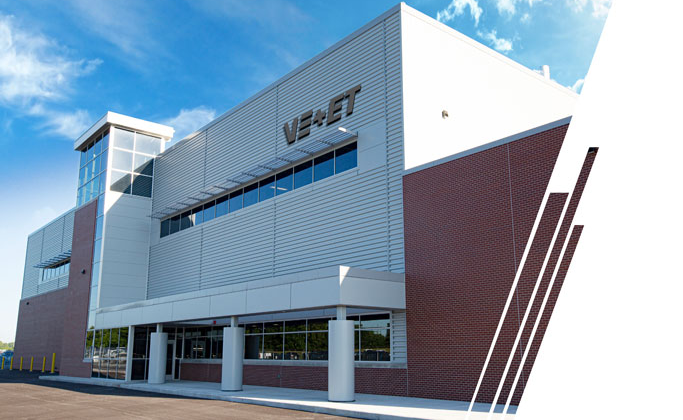
The U.S. electrification centers are located in Indianapolis, Indiana and Auburn, Michigan while the UK center is located in London. The company’s Vehicle Electrification + Environmental Test Center (VE+ET), located at Allison headquarters in Indianapolis, is a 60,000 sq ft facility opened in 2020 that offer a wide range of vehicle electrification testing services to help customers get to market faster. For more info, see www.allisontransmission.com.



